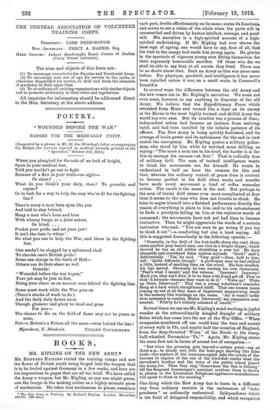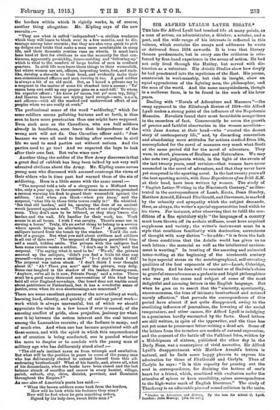BOOKS.
MR. KIPLING ON THE NEW ARMY.• MB. RuDYARD KIPLING visited the training camps and saw the flower of British youth being forged into the weapon that is to be hurled against Germany in a few weeks, and here are his impressions in pages that are all too brief. We•have called the Army a weapon, but Mr. Kipling, as any one might guess, saw the troops in the making rather as a highly animate piece of mechanism. He takes that mechanism to pieces, examines • TM Nee Amy in Training. By Badyerd Kipling. London: Macmillan add On. OM. net.]
each part, dwells affectionately on its name, states its functions, and seems to see a vision of the whole when the parts will hi reassembled and driven by human intellect, courage, and good- will. His narrative is a high.spirited account of a high- spirited undertaking. If Mr. Kipling had ever shown the least sign of ageing, one would have to say, first of all, that his visit to the camps had made him young again. He glories in the spectacle of vigorous young men fitting themselves for their supremely honourable sacrifice. Of those who die we shall be able to say that at all events they lived. There can be no doubt about that. Such an Army as this was never seen before. For physique, goodwill, and intelligence it has never been equalled unless it was, on a small scale, in Cromwell's Ironsides.
In several ways the difference between the old Army and the new comes out in Mr. Kipling's narrative. We most not even seem, however, to say anything in dispraise of the old Army. We believe that the Expeditionary Force which retreated from Mons and turned like a tiger on its enemy at the Marne is the most highly trained and skilful Army the world has ever seen. But its creation was a process of time; independent action had become an instinct from untiring habit, and had been instilled by the infinite patience of its officers. The New Army is being quickly fashioned, and its average of brain-power and its enthusiasm for the end in view match the emergency. Mr. Kipling quotes a military police- man, who stood by him while he watched some drilling, as saying: "The more a man has in his head, the harder it is for him to manage his carcass—at first." That is radically true of military drill. The man of trained intelligence wants to think the movements out for himself. He wants to understand in half an hour the reasons for this and that, whereas the ordinary recruit of peace time is content to become perfect in his drill when weeks and months have made every movement a kind of reflex muscular action. The result is the same in the end. But perhaps to the man of brains drill seems even more complicated at first than it seems to the man who does not trouble to think. He tries to argue himself into a finished performance directly the reason of everything is plain to him, and to his astonishment he finds a paralysis falling on him at the explosive words of command; the movements have not yet had time to become instinctive. Then he might appreciate the words of a certain instructor who said: "You are sure to go wrong if you try to think it out "—a comforting but also a hard saying. All this is suggested dramatically in the following episode :—
" Presently, in the drift of the foot-traffic down the road, there came another grey-haired man, one foot in a bright slipper, which showed he was an old soldier cherishing a sore toe. He drew alongside and considered these zealous myriads. Good?' said I, deferentially. 'Yes,' he said. ' Very good'—then, half to him- self Quite different, though.' A pivot-man near us had shifted a little, instead of marking time, on the wheel. His face clouded, his lips moved. Obviously he was cursing his own clumsiness. 'That's what I meant,' said the veteran. 'Innocent! Innocent! Mark you, they ain't doin' it to be done with it and get off. They're doin' it because—because they want to do it! Wake up I Wake up there, Isherwood!' This was a young subaltern's reminder flung at a back which straightened itself. That one human name coming up out of all that maze of impersonal manceuvring stuck in the memory like wreckage on the ocean. ' An' it wasn't 'ardly even necessary to caution Mister Isherwood,' my companion com- mented. 'Probly he's bitterly ashamed of 'imself.'” Several times we can see Mr. Kipling's mind working in joyful wonder at the extraordinarily mingled draught of military fishes which has come into the net of the War Office. " When companies numbered of one could hear the tone and accent of every walk in life, and maybe half the counties of England, from the deep-throated' Woon ' of the North to the sharp, half.whistled Devonshire • Tu.'" Again, Mr. Kipling states the same fact not in terms of accent but of occupation:— " Bat when the grousing gets beyond a certain point—say at three a.m., in steady wet, with the tent-pegs drawing like false teeth—the nephew of the insumnce-agent asks the cousin of the baronet to inquire of the son of the fried-fish vendor what the' stevedore's brother and the tutor of the public school joined the Armyfor. Then they sing 'Somewhere the Sun is Shrning' till the Sergeant Ironmonger's assistant cautions them to drown in silence or the Lieutenant Telephone-appliancos-manufacturer will speak to them in the morning!'
One thing which the New Army has to learn in a different way from ordinary recruits is the uselessness of "inde- pendence" as ordinarily understood. Independence which is the fruit of delegated responsibility, and which recognizes
the borders within which it rightly works, is, of course, another thing altogether. Mr. Kipling says of the new recruits :— " They are what is called 'independent'--a civilian weakness which they will learn to blush over in a few months, and to dis- 4:enrage among later recruits ; but they are also very quick to pick up dodges and tricks that make a man more comfortable in camp life, and their doinestie routine runs on wheels. It must have been bard at first for civilians to see the necessity for that con- tinuous, apparently pernickity, house-maiding and 'following-up' which is vital to the comfort of largo bodies of men in confined quarters. In civil life men leave those things to their womenfolk, but where women are not, officers, inspecting tents, feet, and such- like. develop a she-side to their head, and evidently make their non-commissioned officers and men develop it too. A good soldier is always a bit of an old maid. But, as I heard a private say to a sergeant in the matter of some kit chucked into a corner: • To canna keep owt redd ap ony proper gate en a sand-hill: To whom his superior officer : 'Al, know yo' canna, but yo' 1111.111 try, Slily! And Heaven knows they are trying hard enough--men,
and officers—with all the masked and undervoiced effort of our peoples when we are really at work."
The professional sense of the word "soldiering," which for some soldiers means polishing buttons and so forth, is thus seen to have more penetration than one might have supposed. Even such men as the Canadians, who are half soldiers already in handinees, soon learn that independence of the wrong sort will not do. One Canadian officer said : "Just because we were all used to looking after ourselves in civil life we used to send parties out without rations. And the parties used to go tool And we expected the boys to look after their own feet, But we're wiser now."
Another thing the soldier of the New Army discovers is that a great deal of rubbish has long been talked by not very well educated civilians about the Army. Mr. Kipling came across young men who discussed with amused contempt the views of their elders who in time past had warned them of the sin of soldiering. Here is a little scene with the same moral
"The corporal told a tale of a clergyman in a Midland town who, only a year ago, on the occasion of some manoeuvres, preached
a sermon warning his flock to guard their womenfolk against the soldiers. • And when you think—when you know,' said the corporal, • what life in those little towns really is / • He whistled. glee that old landau, said he, opening the door of an ancient wreck jammed against a wall. 'That's two of our chaps' dressing- room. They don't care to be billeted, so they sleep %wenn the landau and the wall. It's handier for their work, too. Work dimes in at all hours. I wish I was cavalry. There's some use in earning a horse."I•rnly, it's an awful thing to belong to a service where speech brings no alleviation. 'Pout' A private with callipers turned from the bench by the window. • You'd die out- side of a garage. But what you said about civilians and soldiers b all out of date now.' The sergeant of Regulars permitted him- self a small, hidden simile. The private with the callipers had been some twelve weeks a soldier. • I don't any it isn't,' said the corporal. • I'm saying what it used to be.' • We-ell,' the private screwed up the callipers, 'didn't you feel a little bit that way ]oneself—when you were a civilian P' I—I don't think I did.' The oorporal was taken aback. • I don't think I ever thought about it.' Ah • There you are!' said the private, very drily. Some ens laughed in the shadow of the landau dressing-room. 'Anyhow, we're all in it now, Private Peru.' said a voice. There must be a good many thousand conversations of this kind being held all over England nowadays. Our breed does not warble much about patriotism or Fatherland, but it has a wonderful sense of justice, even when its own shortcomings are concerned."
There are some excellent pictures of the new artillery at work, learning hard, silently, and quickly ; of railway patrol work— work which is always uneventful, bat of which we should appreciate the value in a few hours if ever it censed; of the amusing conflict of pride, class prejudice, jealousy (or what- ever it is) between the cotton interest and the coal interest among the Lancashire recruits; of the Indiana in camp; and of much else. And when one has become acquainted with all these scenes, and with the spirit in which this unprecedented act of creation is being conducted, one is puzzled whether the more to despise or to condole with the young man of military age who has deliberately stood aloof :— " The old safe instinct saves us from triumph and exultation. But what will be the position in years to come of the young man who ban deliberately elected to outcast himself from this all- embracing brotherhood P What of his family, and, above all, what of his descendants, when the hooks have been dolled and the last balance struck of sacrifice and sorrow in every hamlet, village, parish, suburb, city, shire, district, province, and Dominion throughout the Empire?"
As one also of America's poets has said:- " When the brown soldiers come back from the herders,
How will he look while his features they scan?
How will he feel when he gets marching orders,
Signed by his lady-love, sweet little man 1,"







































 Previous page
Previous page